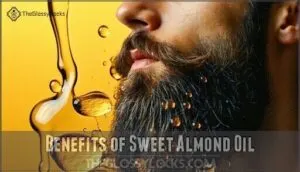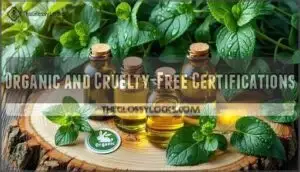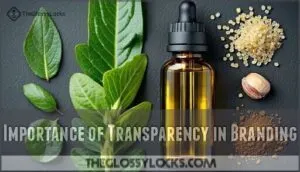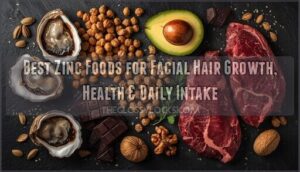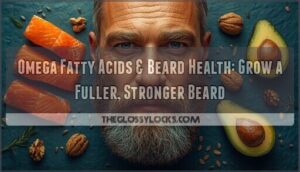This site is supported by our readers. We may earn a commission, at no cost to you, if you purchase through links.
 When picking your beard oil, steer clear of ingredients that play dirty.
When picking your beard oil, steer clear of ingredients that play dirty.
Skip synthetic fragrances—they love to irritate sensitive skin and might make your chin itch like mad.
Parabens are another to avoid, since they can mess with your hormones and no one likes surprises there.
Sulfates, the stuff in strong shampoos, will dry out your beard and leave your skin flaky.
Mineral oil may clog pores and keep your beard from living its best life.
Checking that ingredients list could save you from beard woes—keep reading, because there’s more to caring for your beard than just choosing what to avoid.
Table Of Contents
- Key Takeaways
- Harmful Beard Oil Ingredients
- Red Flags in Ingredient Lists
- Safe and Natural Alternatives
- Certifications and Labels to Look For
- Healthy Beard Care Practices
- Frequently Asked Questions (FAQs)
- What are the bad ingredients in beard oil?
- What are the best ingredients for beard oil?
- What oils are safe for beards?
- Is beard oil bad for your beard?
- Do beard oil ingredients interact with acne medications?
- How do beard oil ingredients impact beard texture?
- Can beard oil ingredients transfer to pillowcases or clothes?
- Conclusion
Key Takeaways
- You’ll want to steer clear of beard oil ingredients like synthetic fragrances, parabens, sulfates, and mineral oil, as they can irritate your skin, mess with your hormones, and dry out your beard.
- When shopping for beard oil, it’s crucial to check the ingredient list and avoid harsh chemicals that can strip your skin and beard of natural oils, causing more harm than good.
- You should opt for natural and organic ingredients like jojoba oil, argan oil, and vitamin E, which can help nourish and moisturize your beard without causing irritation or other negative effects.
- By being mindful of the ingredients in your beard oil and choosing products with safe and natural components, you can promote healthy beard growth, prevent dryness and irritation, and keep your beard looking its best.
Harmful Beard Oil Ingredients
You’re likely using beard oil to keep your beard healthy and looking its best.
A well-chosen beard oil is your best ally for a beard that looks great and feels even better.
When you’re shopping for beard oil, it’s vital to check the ingredient list and avoid harmful ingredients like alcohol, synthetic fragrances, and parabens that can strip your skin and beard of natural oils, which can actually do more harm than good, especially because they can strip your skin and beard of natural oils.
Alcohol and Its Effects
You’re looking at alcohol’s drying effects, which can cause follicle damage, acne aggravation, and flakiness severity.
Consider alcohol-free alternatives to prevent dehydrated skin and loss of skin elasticity. One should also consider organic beard oil for safer grooming.
- Alcohol strips moisture
- Causes follicle damage
- Aggravates acne
- Increases flakiness
- Dehydrates skin, leading to loss of skin elasticity
Synthetic Fragrances and Allergies
The word "fragrance" on beard oil labels masks a cocktail of undisclosed chemicals that can trigger allergic reactions in up to 30% of users.
These synthetic fragrances often contain fragrance allergens like linalool and limonene, causing skin sensitivity, respiratory issues, and potential endocrine disruption.
Hidden ingredients are often not disclosed on product labels, making artificial fragrances a gamble for your beard and health.
Hidden chemicals slip past regulatory oversight, leading to potential endocrine disruption and causing skin sensitivity.
Parabens and Hormonal Imbalance
With every dab of beard oil, you could be inviting parabens into your daily routine—often without knowing it.
Each drop of beard oil could be introducing hidden parabens straight into your daily grooming routine—often without your knowledge.
Here’s why it matters:
- Paraben exposure can mess with your hormonal balance, acting as endocrine disruptors.
- Studies suggest links to reproductive issues and even cancer risks.
- Regulatory actions now spotlight these hidden hazards—don’t ignore hormone disruption in your grooming kit. Parabens, found in many products, can mimic the hormone estrogen.
Sulfates and Skin Irritation
After learning how parabens can throw hormones out of whack, let’s spot a different troublemaker—sulfates.
Sulfate types like sodium lauryl sulfate and sodium laureth sulfate strip natural oils, leaving your beard and skin dry or itchy.
For irritation prevention, check product labels for sulfate alternatives.
Sensitive skin gets along best with gentle cleansers that skip harsh sulfates altogether.
Mineral Oil and Pore Clogging
In the context of beard oils, steer clear of mineral oil—it’s notorious for pore clogging and triggering the classic comedogenic effects.
This kind of oil buildup blocks skin respiration, sparking acne formation and skin irritation.
Instead, stick to ingredient alternatives like jojoba or argan oil to avoid comedogenic beard oil problems and promote a clearer, healthier beard.
Red Flags in Ingredient Lists
When scanning ingredient lists, you’ll need to spot chemical names that spell trouble for your beard and skin.
Learning to identify these red flags helps you avoid products that could cause irritation, hormonal disruption, or long-term damage to your facial hair health.
Checking for Toxic Chemicals
Your product’s ingredient analysis starts with chemical identification — learning to spot toxic beard oil ingredients hiding behind scientific names.
Brand transparency matters because companies often disguise harmful beard oil chemicals in complex formulations.
Here’s your toxicity levels checklist for label scrutiny:
- Formaldehyde releasers – Look for quaternium-15, DMDM hydantoin, imidazolidinyl urea
- Phthalates – Often hidden in "fragrance" or "parfum" listings
- Polycyclic aromatic hydrocarbons – Found in petroleum-based ingredients
- Synthetic chemicals – Ingredients to avoid include anything ending in -paraben or -sulfate
Identifying Harsh Preservatives
Harsh preservatives lurk in many beard oils, wreaking havoc on your skin and hormones.
Parabens alternatives like natural vitamin E offer safer preservation without the risks.
Formaldehyde releasers and urea dangers make ingredient lists your first line of defense against harmful ingredients.
| Harmful Preservative | Common Names | Health Risks |
|---|---|---|
| Parabens | Methylparaben, Propylparaben | Hormone disruption, allergies |
| Formaldehyde Releasers | Quaternium-15, DMDM Hydantoin | Skin irritation, carcinogenic |
| Phthalates | Hidden in "fragrance" | Endocrine disruption, organ damage |
| Triclosan | Triclosan | Antibiotic resistance, hormonal issues |
Safe preservatives like tocopherol (vitamin E) protect your beard oil without the phthalates risks that come with synthetic alternatives.
Avoiding Artificial Colors
Your beard oil’s artificial colors serve zero purpose beyond marketing tricks.
These FD&C dyes trigger dye allergies and skin sensitivities without adding any benefits.
Smart consumers practice ingredient research, recognizing that color alternatives like natural oils provide the same function safely.
Don’t fall for label deception—unsafe beard oil often hides harmful ingredients behind appealing colors.
Consumer awareness protects you from unnecessary risks in beard oil ingredients and ingredient lists.
Recognizing Endocrine Disruptors
Beyond artificial colors, hormone disruption presents a serious threat to your health.
Endocrine disruptors like phthalates and parabens mimic hormones, causing hormonal imbalances that affect reproductive health and thyroid function.
These chemicals trigger hormone mimicry, leading to reproductive effects, thyroid disruption, cancer risks, and developmental issues.
Watch for "fragrance" or "parfum" on labels—they often hide phthalates causing endocrine disruption.
Safe and Natural Alternatives
Now that you understand the harmful ingredients lurking in most beard oils, let’s explore the natural alternatives that actually nourish your facial hair.
These plant-based powerhouses deliver superior results without the chemical baggage, proving that nature often knows best in the context of beard care.
Benefits of Jojoba Oil
Jojoba oil stands out among natural oils because it’s technically a liquid wax that closely mimics your skin’s natural sebum.
This unique composition means it won’t clog pores while delivering exceptional moisturizing properties.
You’ll notice reduced dandruff and irritation relief as jojoba oil balances sebum production naturally.
Consider jojoba oil products for beard care, its lightweight texture provides growth support without greasiness, making it perfect for maintaining healthy skin health in your beard care routine.
Advantages of Argan Oil
Frequently overlooked yet powerful, argan oil delivers exceptional Argan Oil Benefits for beard care.
This Moroccan treasure enhances Beard Softness while providing vital Hair Protection against environmental damage.
Rich in vitamin E and essential fatty acids, argan oil promotes Skin Hydration without clogging pores.
Argan oil can also help provide essential sun protection for your beard.
When choosing natural ingredients for your beard routine, argan oil stands out among quality beard oil ingredients to embrace rather than avoid beard oil containing synthetic alternatives.
Importance of Vitamin E
You’ve learned about argan oil’s powers, but don’t skip vitamin E—it’s your beard’s silent hero.
Vitamin E offers:
- Antioxidant Properties: Shields your skin from daily stress and helps avoid beard oil dangers.
- Skin Elasticity: Keeps things firm and smooth.
- Scar Reduction: Fades pesky marks, strengthens hair, and works as a hydration booster.
Vitamin E promotes overall wellness.
Choose beard oil ingredients wisely.
Uses of Tea Tree Oil
With tea tree oil in your beard oil, you’re not just stroking your beard—you’re fighting skin irritation and dandruff with proven antifungal properties.
It’s often used for acne treatment and wound healing, too.
You can even find various tea tree products for different applications.
For beard growth, tea tree oil helps keep pores clear, making it a smart choice if you’re wary of irritating beard oil ingredients.
Benefits of Sweet Almond Oil
Sweet almond oil is a top pick for beard oil ingredients if you want real beard oil benefits.
It delivers skin conditioning, hair softening, and inflammation reduction in one punch.
You’ll notice improved shine and a non-greasy feel.
Because sweet almond oil is a natural oil, it boosts skin health without clogging pores or irritating sensitive skin.
Certifications and Labels to Look For
When you pick out a beard oil, checking the certifications and labels can help you avoid harsh chemicals you don’t want near your skin.
You’ll find that looking for trusted seals like “organic” or “cruelty-free” often goes a long way and saves you from a beard-care mishap.
Organic and Cruelty-Free Certifications
You verify organic and cruelty-free certifications, ensuring ethical sourcing and animal welfare.
Look for USDA Organic and Leaping Bunny logos, guaranteeing ingredient integrity and transparency, with benefits including safer products and promoting eco-friendly practices.
Through label verification and certifications, you can ensure the benefits of these practices, including safer products.
Understanding Natural and Organic Labels
When shopping for beard oil, beware of label misconceptions and greenwashing tactics.
Look for certifications validating organic ingredients and natural formulations, ensuring product transparency and authentic ingredient sourcing, to make informed choices about the products you use.
Check ingredient labels carefully for natural defined ingredients.
Many users also seek organic shea butter for its skin-soothing properties.
Importance of Transparency in Branding
When choosing beard oil, you deserve honest labeling and ethical sourcing.
Look for ingredient transparency, clear communication, and brand accountability.
Prioritize certifications and ingredient disclosure to guarantee your safety and satisfaction, promoting a positive brand reputation through transparent product sourcing.
Researching Customer Reviews and Ratings
You research customer reviews and ratings, considering:
- Review authenticity
- Rating consistency
- Brand reputation
to verify product effectiveness and brand quality, guiding your beard oil choices with online reviews and sentiment analysis.
Healthy Beard Care Practices
You’re taking the first step in the direction of a healthier beard by learning about the ingredients to avoid in beard care products.
By adopting healthy beard care practices, you can prevent dryness and irritation, promote healthy growth, and maintain a strong and shiny beard.
Balancing Oil Production
You balance oil production by understanding sebum regulation.
Natural sebum helps with oil control, avoiding overproduction.
Healthy follicles rely on clear pores.
| Sebum | Oil Control | Follicles |
|---|---|---|
| Natural | Avoiding Overproduction | Healthy |
| Comedogenic | Clogging Pores | Damaged |
| Noncomedogenic | Clear Pores | Thriving |
| Excess | Acne | Clogged |
| Balanced | Regulated | Clear |
The table outlines the relationship between sebum, oil control, and follicle health, highlighting the importance of balanced sebum production for healthy skin.
Preventing Dryness and Irritation
You prevent dryness and irritation by using gentle cleansing and hydration techniques.
Avoiding harmful ingredients and beard oil allergens that trigger skin irritation is crucial.
Doing patch testing to verify your beard oil doesn’t cause dryness or other side effects is also important.
Promoting Healthy Growth and Shine
You promote healthy beard growth and shine by using natural oils, growth vitamins, and maintaining a healthy diet.
Trimming techniques also help, as does a balanced lifestyle, to achieve maximum beard thickness and natural shine, supporting overall hair growth for a healthy beard.
Understanding the Anagen growth phase is key to beard health.
Using Essential Oils for Therapeutic Benefits
Letting your beard shine is one thing—keeping it calm and comfortable is another. Essential oils bring therapeutic benefits when blended right.
Oil dilution and careful carrier selection reduce skin irritation. Aromatherapy benefits can ease stress, too.
Focus on blending techniques, check for skin sensitivity, and use only natural essential oils for healthier, happier skin and beard.
- Oil dilution matters for irritation prevention
- Choose safe carrier oils
- Always blend properly
- Watch for skin sensitivity
- Opt for natural essential oils
Maintaining a Healthy Skin and Beard Routine
You’ve used essential oils, but a healthy skin and beard routine goes beyond scent.
Wash your beard regularly—don’t overdo it—and trim using clean, sharp tools.
A balanced diet and staying hydrated can work wonders.
Keep an eye out for beard oil allergens or harmful ingredients, especially if you notice skin irritation, sensitivities, or unexpected reactions.
Manage stress for consistent results, and be mindful of your overall routine to maintain a healthy skin and beard, including watching for allergens.
Frequently Asked Questions (FAQs)
What are the bad ingredients in beard oil?
Watch out for alcohol, parabens, sulfates, and mineral oil in your beard oil.
These troublemakers dry out skin, clog pores, and can even mess with your hormones.
A little label reading goes a long way, trust me.
What are the best ingredients for beard oil?
Funny how the best beard oils often mirror nature—jojoba, argan, and sweet almond oils hydrate without greasiness.
Vitamin E boosts growth, tea tree oil calms skin.
Stick with these, and your beard can truly thrive.
What oils are safe for beards?
You can safely use jojoba, argan, and sweet almond oils on your beard, as they moisturize and nourish without harmful side effects, promoting healthy growth and softness.
Is beard oil bad for your beard?
Like a double-edged sword, beard oil can be beneficial or harmful, depending on its ingredients, so you’ll want to choose wisely to nurture your beard, not neglect it.
Do beard oil ingredients interact with acne medications?
You should check beard oil ingredients, as some may interact with acne medications, such as retinoids or antibiotics, and cause adverse reactions or reduce their effectiveness.
How do beard oil ingredients impact beard texture?
You’ll notice that certain beard oil ingredients, like sulfates and mineral oil, can strip your beard’s natural oils, leading to dryness and brittleness, affecting its overall texture and health.
Can beard oil ingredients transfer to pillowcases or clothes?
You can transfer beard oil ingredients to pillowcases or clothes, so be mindful of what you’re applying to avoid stains and skin irritation from harsh chemicals.
Conclusion
Exploring beard care, you’re now equipped to spot harmful beard oil ingredients to avoid, prioritizing your skin’s health.
Remember, beard oil ingredients to avoid can make or break your beard’s comfort and appearance, so choose wisely to keep your beard thriving.
- https://www.thebeardstruggle.com/blog/what-beard-oil-ingredients-you-should-avoid-and-why?srsltid=AfmBOoqBXBLxjeZz3Dqxj1-U4ROxeK5aOWfguLPSo1qJR0XjGJlQFbg9
- https://thebeardedbrotherhood.co/blogs/beard-essentials-blog/beard-care-101-grooming-ingredients-to-avoid?srsltid=AfmBOoqd9v_BF5cEB25oGFfBM8yTQhsWEWJS_uuaiiU-52HQxVNCPgga
- https://www.beardbeasts.com/blogs/news/beard-oil-ingredients-to-avoid?srsltid=AfmBOooGoPbgilZVp5c9TBn0j0aqyFqJAvpm6dWaCeXRc4cd2NV9vscd
- https://www.texasbeardcompany.com/blogs/texas-beard-co/4-ingredients-that-cause-more-harm-than-good-as-you-look-after-your-beard?srsltid=AfmBOorNySPuRxS3xWwbAPJhlIc26LbzET0wYfDNcHrMV1FGQ6bJJNuS
- https://health.clevelandclinic.org/what-are-parabens






